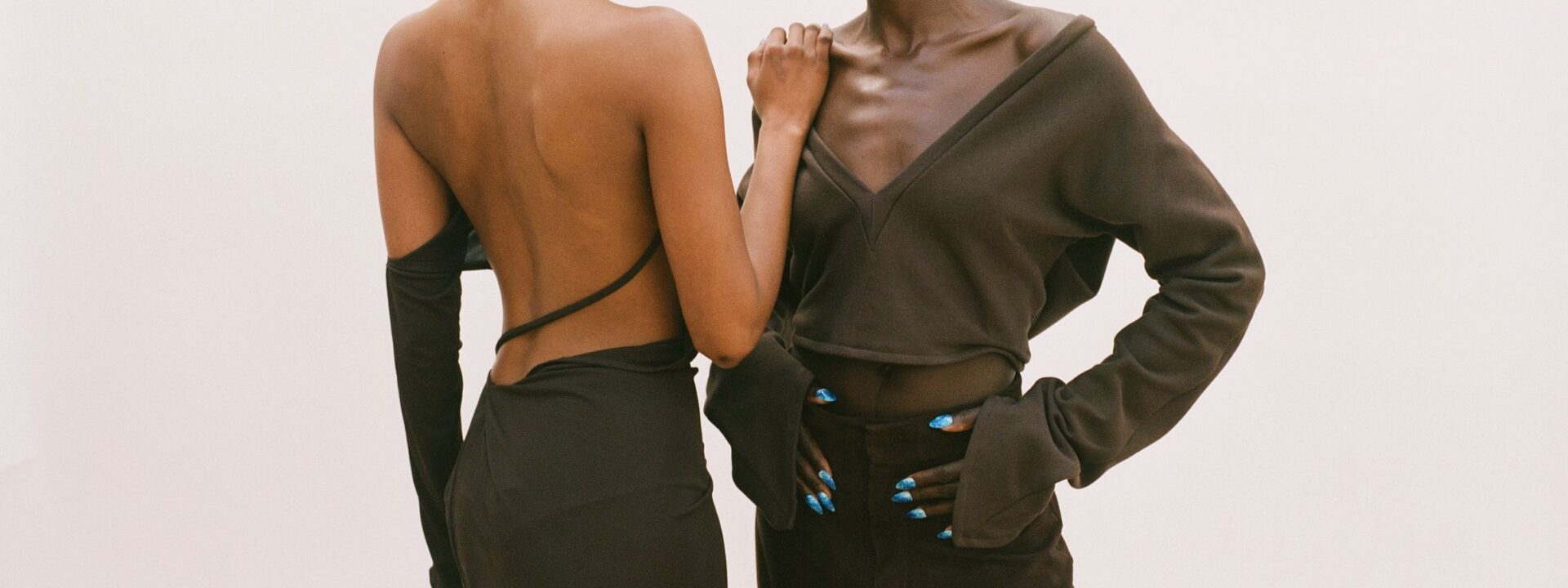Ronan McKenzie has just returned to her London home, feeling refreshed after spending time in a small Italian village in the Alps. There, she curated an artist residency program, taking part in workshops and one-on-one sessions.
“The fashion and art worlds feel a bit chaotic right now, so exploring, learning, and experimenting with different mediums together was really fulfilling,” says McKenzie, who led her own live draping workshop. The photographer, multidisciplinary artist, and designer is now preparing for a takeover at London’s beloved cult bookstore, Tenderbooks. She’ll showcase pieces from her brand Selasi’s Fall 2025 collection, alongside core designs, a selection of inspiring books, and the latest issue of her print publication, Selasi Stories.
Selasi, which means “God hears me” in the Ghanaian language Ewe, turns five this year. Born during lockdown, the brand has always centered on intimacy and elegance—seen in McKenzie’s reimagined contemporary art space Home (which ran until 2023), her deeply personal photography, and Selasi’s sensual dresses and sharp tailoring in rich earth tones. But for McKenzie, who has worked across multiple mediums, galleries, and performances, this is the first year she’s devoted herself fully to Selasi.
“It’s always been my fun side project, but also a creative outlet where I can collaborate and express myself in a tangible way,” she says. “I want Selasi to be with me for life, so slow, steady, sustainable growth has been key.”
Selasi Fall 2025.
Photo: Ronan McKenzie
“I do a lot of work that requires different levels of compromise,” she continues. “When I had my gallery, I was very community-focused. Selasi is still about the people around me, but it’s also where I have complete creative freedom.”
Even so, it remains a family and community effort—her mother is currently out of town picking up bookmarks for the launch event. “My intern,” McKenzie jokes. “But really, my mom has been with me every step of the way—wearing Selasi’s T-shirts and baggy pants all the while. It’s been special to grow this brand with her support. Now, I feel really focused on where I’m headed.”
Selasi Fall 2025.
Photo: Ronan McKenzie
McKenzie sees Selasi as an umbrella for exploring everything from design to performance to furniture. “I never planned to have a brand, so it came from a pure, non-commercial place.” Now, she’s ready to take the next steps.
The Fall 2025 collection, titled For Ronan, reimagines Selasi’s core pieces with new textures and materials. Much of it was inspired by a trip to Lanzarote—its volcanic landscapes and César Manrique’s architecture at Lag-O-Mar, a home built into the rock and surrounded by bougainvillea (a flower also abundant in Barbados, where her mother is from). The collection features deep, warm orange tones, with elegant boiled wool and deadstock suede replacing toweling.
The Hallie suit—named after her mother’s older brother—is a boxy set with back draping, made in technical white nylon, expanding McKenzie’s tailored offerings. A burnt-orange gown, Claudette, was inspired by a custom look she created for British painter Claudette Johnson. Returning favorites include the baggy pants (now in English wax cotton that ages like soft leather) and new versions of the Black Rock series, named after a neighborhood in Barbados. Elsewhere, the We Love… [text cuts off]Barbados’ jacket—named after a discount store on the island—has a signature, sensual curve that accentuates the waist and comes in both trench and cropped styles. Ruching remains a key feature in Selasi designs, adding both comfort and flair. “I add ruching in areas where I might feel insecure or want to highlight—so I feel comfortable, elegant, and powerful,” says designer Ronan Mckenzie.
A friend recently described the feeling of wearing Selasi: “It doesn’t try to change you—it reveals you.”
Mckenzie is also working on a bag inspired by a birthday trip to Brazil, where she carried a simple tote back and forth from the beach, holding her phone, keys, and notebook. “I’m not overly precious with things,” she says. “I take care of them, but I believe they’re meant to be used. So I want a bag that can go everywhere with you.” The design is a cotton-canvas bag shaped like Barbados, with removable clips that convert it into a handbag, belt bag, or crossbody. She’s also developing leather driving gloves.
“I just want to keep creating pieces that let people engage with Selasi in everyday life,” she explains. “Making things accessible might sound cheap, but I want people to have more ways to connect with the brand—whether through a newspaper, a bag, or a special jacket.”
The fourth issue of Selasi Stories shifts toward longer editorial pieces, with Mckenzie writing a heartfelt editor’s letter. She hopes to expand the publication with outside contributions and varied formats while keeping it as a tangible, printed piece—a contrast to today’s fast-paced, digital content. This summer-themed issue features British-Nigerian architect and designer Miminat Shodeinde and Thai-British artist Srirat Jongsanguandi, both of whom inspire Mckenzie. (Jongsanguandi’s bag sculpture even sits on Mckenzie’s shelf.) Their work reflects themes of the body, intimacy, and warmth—core to Selasi’s ethos.
At a celebratory event at Tenderbooks, surrounded by friends, flowers, and books she curated, Mckenzie shared her recent reading list. It includes I’m Black, So You Don’t Have To Be by Colin Grant—a memoir about the West Indian British experience—and Rest Is Resistance by Tricia Hersey, which explores the importance of slowing down. Both resonate with her work.
From the newspaper to puzzles, baby tees, and bold suits, Ronan Mckenzie continues to expand her vision for Selasi. “I’m not just making clothes that look cool—I want pieces that evolve with us, helping us express different feelings, whether it’s confidence, sensuality, or calm,” she says. “A newspaper, a bag, or a garment isn’t the end goal—it’s part of your support system for navigating the world.”
Featured in Selasi Stories Issue 4:
– Miminat Shodeinde
– Srirat Jongsanguandi
Photos by Ronan Mckenzie
